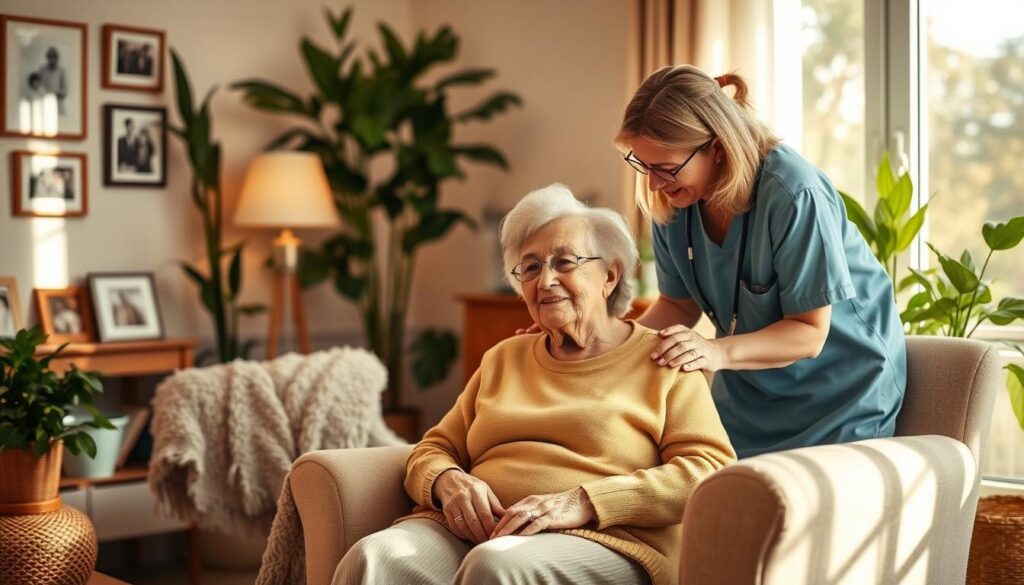Did you know that over 30% of seniors don’t want help, even when they need it? This fact shows how complex caring for our ageing loved ones can be. As more older adults live longer, we need compassionate care that respects their wish to be independent and ensures their well-being.
Senior care is more than just helping with daily tasks. Many elderly people don’t want help because they see it as losing control or freedom. This makes it hard for families to support them, leading to burnout and stress for caregivers.
But there’s hope. Professional home care services can help. They let seniors stay independent while getting the care they need at home.
Keka Rehab Services offers many services with years of experience. They help with everything from living on their own to skilled nursing, ensuring every senior’s unique needs are met. Such a wide range of services improves seniors‘ lives and gives their families peace of mind.
We will examine the growing need for compassionate senior care, explore the critical role of caregivers, and discuss how to make care plans that really help our ageing loved ones.
Key Takeaways
- Many seniors resist accepting help due to fears of losing independence
- Professional home care services offer personalized support while maintaining dignity
- Comprehensive care options cater to various needs within the senior care sector
- Experienced providers provide a range of services, from independent living to skilled nursing
- Compassionate care improves the quality of life for seniors and provides peace of mind for families
Understanding the Growing Need for Senior Care
The senior care landscape is changing fast as more people age. The World Health Organization says the number of people over 60 will jump from 1 billion in 2020 to 2.1 billion by 2050. This means more seniors will need places like assisted living, retirement homes, and nursing facilities.
The Aging Population and Increased Demand for Caregivers
Baby Boomers are getting older, and so is the need for caregivers. In the U.S., 17.3% of people are 65 or older, and most will need long-term care. This is why the home care market is expected to hit $100 billion by 2024.
Challenges in the Current Healthcare System for the Elderly
The senior care industry has significant challenges. There aren’t enough workers, especially in nursing and direct care, and many leave their jobs. Plus, there are many laws care providers must follow.
The Importance of Compassionate Caregiving
Compassionate care is critical for seniors’ well-being. In Boston, assisted living costs about $ 6,819 a month. This shows that we need affordable, quality care. New care models like adult day care and intergenerational living are being tried to meet seniors’ needs.
Technology is also helping in senior care. Remote monitoring and smart homes are improving care and seniors’ lives. With more seniors using the internet, telemedicine can help them a lot.
The Role of a Compassionate Caregiver
Compassionate caregivers are vital in helping elderly people with their daily needs and emotional well-being. Thanks to better healthcare and longer lives, the need for caregivers is growing as more people live longer. Your job goes beyond just helping with tasks. It’s about making a real difference in the lives of seniors.
Caregivers face unique challenges in long-term care. The healthcare system for the elderly often doesn’t meet their needs, so your caring approach is more critical than ever. Studies show that showing compassion in healthcare makes patients happier and more satisfied.

- Helping with daily activities like bathing, dressing, and grooming
- Managing medications effectively
- Providing emotional support
- Promoting independence while offering the necessary assistance
Handling these tasks can be challenging. Caregivers often feel stressed and tired from balancing work and personal life. It’s critical to take care of yourself and keep up your support.
Your caring work makes a big difference. It leads to less pain, better quality of life, and higher patient satisfaction ratings. Being empathetic and understanding, you help your elderly loved one age with dignity.
Developing Empathy and Communication Skills in Senior Care
Empathy is critical in caring for seniors. Caregivers must develop this skill, like those in adult day care and home health aides. When caregivers show empathy, it helps seniors feel better emotionally, stick to their treatment plans, and heal faster.

Active Listening and Validating Feelings
Listening well is essential for understanding seniors. It means paying full attention, showing you care, and reflecting on what they say. This makes seniors feel crucial and valued in their care. Home health aides can use this to gain the trust of their clients.
Building Trust and Understanding
Trust is the base of reasonable care. Caregivers in adult day care can build trust by being empathetic and respectful. Knowing seniors’ challenges, like trouble with reading, helps us talk to them more effectively.
Effective Communication Techniques
Clear, caring communication is vital in senior care. Talking mistakes can lead to many complaints. To prevent mix-ups, speak, be clear, and ensure you understand. These methods help ensure seniors get the health information they need.
By improving these skills, caregivers can provide more tailored and effective care. This improves seniors’ lives and strengthens the bond between caregivers and clients in home and adult daycare settings.
Creating a Personalized Care Plan for Elderly Loved Ones
A personalized care plan is vital to senior care. It lists the services and support older adults need and shows who handles each task.
Comprehensive Health Assessment
Begin by looking at your loved one’s needs. Check their ability to do daily tasks, their health, and how well they think. Think about things like moving around, caring for themselves, their mental health, money, and staying social.
Identifying Unique Needs and Preferences
Draft a care plan with specific tasks and who does them. This could mean getting food, driving them places, handling money, and keeping them company. Getting the family involved can give you great ideas.
Balancing Assistance and Independence
Your care plan should help your loved one stay independent and offer help when needed. It’s essential to consider daily tasks, keeping the home safe and healthy, social life, staying fit, and keeping the mind sharp.
Regular Evaluation and Adjustments
The plan is to check and update the care plan regularly. Keeping it fresh is critical to good care and adapting to health changes. Being flexible helps avoid burnout and makes sure the plan meets new needs.
Good communication, record keeping, and flexibility are vital to caring for seniors. With a well-thought-out care plan, you can help seniors get better care and reduce stress for everyone.
Conclusion: The Impact of Compassionate Senior Care
Compassionate senior care significantly changes the lives of older adults. It’s not just about helping with daily tasks; it also gives them vital social and emotional support. This kind of care can sharpen their minds and improve their health.
Compassionate care helps with both the mind and body. Seniors who get care that allows them to feel less stressed have lower blood pressure and more vital immune systems. These good things can cut the risk of heart disease and stroke by up to 32%.
In places like Phoenix, Arizona, there’s a significant need for caregivers who care deeply about their work. This is because more older people live there and have chronic health issues. Companies like EasyLiving in Clearwater are looking for skilled caregivers to meet the growing need for home care.
Ultimately, compassionate senior care lets older people live with dignity in their homes. It gives families peace of mind and offers an excellent way to live with some help. By keeping seniors connected and active, this care can lower the risk of losing their memory and thinking skills by up to 12%. This means a better life for our ageing loved ones.
FAQ
What is the role of a compassionate caregiver?
Compassionate caregivers help elderly people with daily tasks, health needs, and emotional support. They ensure seniors live well, stay independent, and age with dignity at home.
Why is effective communication important in senior care?
Caregivers must understand and connect with seniors. By listening and showing empathy, they build trust. Clear and caring communication helps them work together better.
How is a personalized care plan created for elderly loved ones?
First, caregivers assess the senior’s health, daily abilities, and medical conditions. They plan out tasks for daily life, health care, and mobility. They also consider emotional and social needs to keep seniors independent but supported.
It’s essential to check and update the care plan often. This ensures it meets the seniors’ changing needs and supports them well.
What are the benefits of compassionate senior care?
Compassionate care improves the lives of seniors by giving them social and emotional support and reducing loneliness. It also helps them stay independent and get the help they need.
This kind of care lets seniors stay in their homes safely and with dignity. It also helps families by giving them peace of mind and a break from caregiving.
Why is there an increased demand for senior care?
More people are living longer, so caregivers are significantly needed. Health care is getting better, and people are living longer. This means more seniors need special care and support.
What are the challenges facing the elderly in the current healthcare system?
The healthcare for seniors is not good enough and is often ignored. It can’t even meet basic needs. That’s why compassionate care is so critical. It offers emotional support and company, not just physical help.
Contact Keka Rehab Services Today for The Best Senior Care Support in The Boston Area
[wpforms id=”854″]








